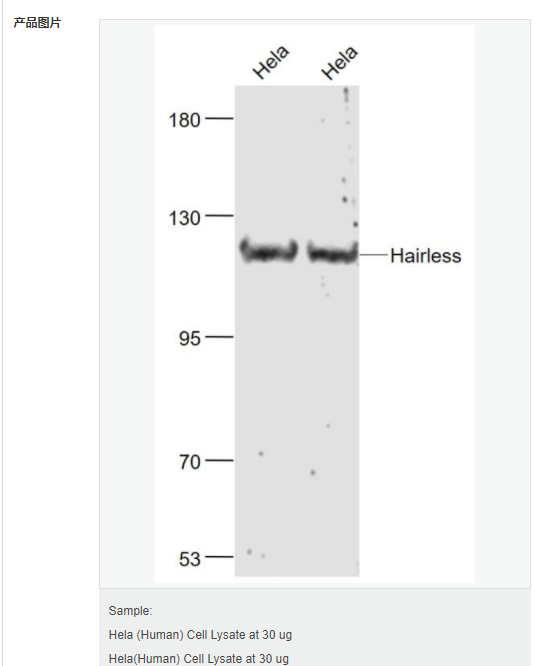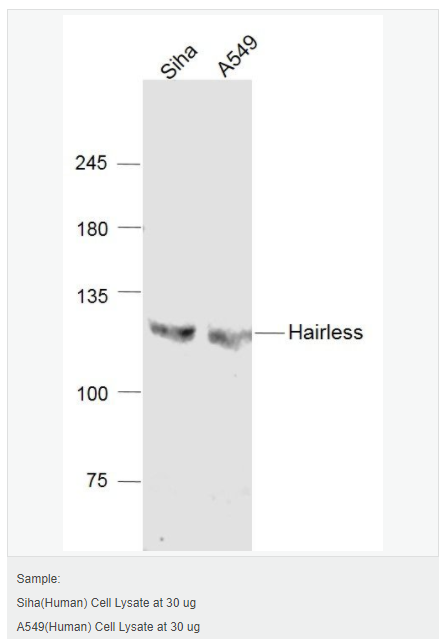

貨號(hào)
產(chǎn)品規(guī)格
售價(jià)
備注
BN41333R-100ul
100ul
¥2360.00
交叉反應(yīng):Human(predicted:Mouse,Rat,Dog,Pig,Cow,Horse,Rabbit,Sheep) 推薦應(yīng)用:WB,ELISA
BN41333R-200ul
200ul
¥3490.00
交叉反應(yīng):Human(predicted:Mouse,Rat,Dog,Pig,Cow,Horse,Rabbit,Sheep) 推薦應(yīng)用:WB,ELISA
產(chǎn)品描述
| 英文名稱 | Hairless |
| 中文名稱 | 無毛發(fā)蛋白抗體 |
| 別 名 | HR; ALUNC; AU; HAIR_HUMAN; Hairless protein; Host range; HSA277165; Protein hairless. |
| 研究領(lǐng)域 | 染色質(zhì)和核信號(hào) 轉(zhuǎn)錄調(diào)節(jié)因子 表觀遺傳學(xué) |
| 抗體來源 | Rabbit |
| 克隆類型 | Polyclonal |
| 交叉反應(yīng) | Human, (predicted: Mouse, Rat, Dog, Pig, Cow, Horse, Rabbit, Sheep, ) |
| 產(chǎn)品應(yīng)用 | WB=1:500-2000 ELISA=1:5000-10000 not yet tested in other applications. optimal dilutions/concentrations should be determined by the end user. |
| 分 子 量 | 127kDa |
| 細(xì)胞定位 | 細(xì)胞核 |
| 性 狀 | Liquid |
| 濃 度 | 1mg/ml |
| 免 疫 原 | KLH conjugated synthetic peptide derived from human Hairless:345-460/1189 |
| 亞 型 | IgG |
| 純化方法 | affinity purified by Protein A |
| 儲(chǔ) 存 液 | 0.01M TBS(pH7.4) with 1% BSA, 0.03% Proclin300 and 50% Glycerol. |
| 保存條件 | Shipped at 4℃. Store at -20 °C for one year. Avoid repeated freeze/thaw cycles. |
| PubMed | PubMed |
| 產(chǎn)品介紹 | Hairless is a 1,189 amino acid protein which is expressed as two isoforms produced by alternative splicing. The two isoforms are expressed in a variety of tissues in varying concentrations. Isoform 1 is more abundant than isoform 2 and is expressed at low levels in kidneys and testis, while isoform 2 is expressed abundantly in skin. Both isoforms are also present together in many tissues and are expressed strongly in small intestine and brain and weakly in trachea. HR is thought to be a transcription factor involved in hair growth. Hair growth occurs in three phases known as anagen, catagen and telogen, which are phases where growth, regression and rest, respectively, are taking place. By unknown mechanisms, HR is thought to regulate one of the hair growth phases and to work with vitamin D receptor (VDR) to regulate hair follicle cycling. Defects in HR may cause two serious ailments, known as alopecia universalis congenita (ALUNC) and atrichia with papular lesions (APL), which is also referred to as congenital atrichia. Both are autosomally recessive impairments. ALUNC is a rare condition in which hair follicles are produced without hair, while APL is a serious disease in which papillary lesions may cover the body and little to no hair is grown. Function: May act as a transcription factor that could act on to regulate one of the phases of hair growth. Subcellular Location: Nucleus. Tissue Specificity: Strongest expression of isoforms 1 and 2 is seen in the small intestine, weaker expression in brain and colon, and trace expression is found in liver, pancreas, spleen, thymus, stomach, salivary gland, appendix and trachea. Isoform 1 is always the most abundant. Isoform 1 is exclusively expressed at low levels in kidney and testis. Isoform 2 is exclusively expressed at high levels in the skin. DISEASE: Defects in HR are the cause of alopecia universalis congenita (ALUNC) [MIM:203655]. ALUNC is a rare autosomal recessive form of hair loss characterized by hair follicles without hair. Defects in HR are the cause of atrichia with popular lesions (APL) [MIM:209500]; also known as congenital atrichia. APL is an autosomal recessive disease characterized by papillary lesions over most of the body and almost complete absence of hair. Defects in HR are the cause of hypotrichosis type 4 (HYPT4) [MIM:146550]. An autosomal dominant condition characterized by reduced amount of hair, alopecia, little or no eyebrows, eyelashes or body hair, and coarse, wiry, twisted hair in early childhood. Similarity: Contains 1 JmjC domain. SWISS: O43593 Gene ID: 55806 Database links: Entrez Gene: 55806 Human Omim: 602302 Human SwissProt: O43593 Human Unigene: 272367 Human Unigene: 41543 Rat Important Note: This product as supplied is intended for research use only, not for use in human, therapeutic or diagnostic applications |

